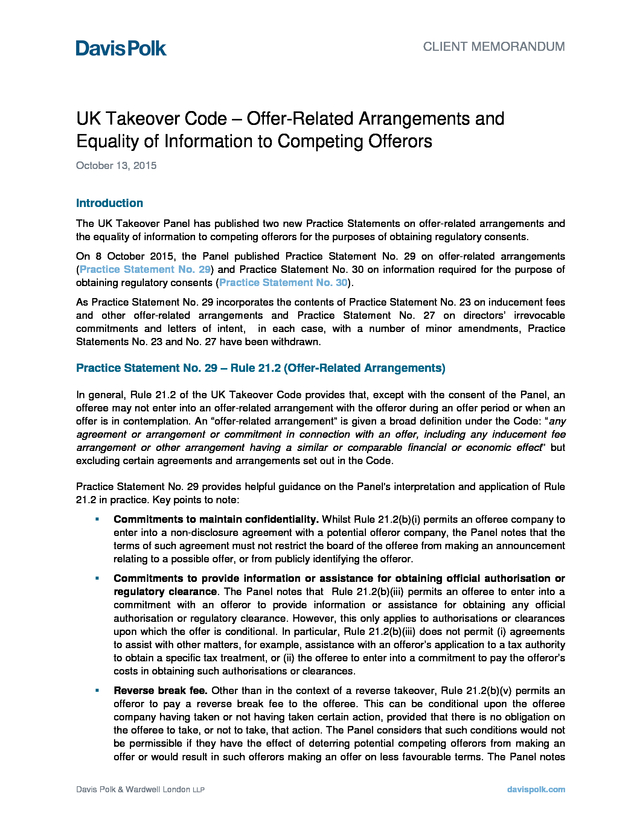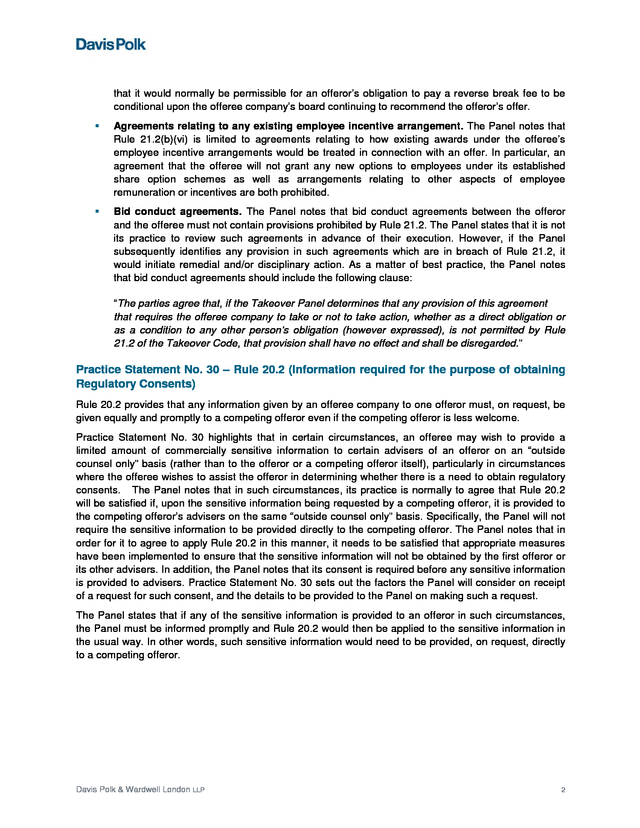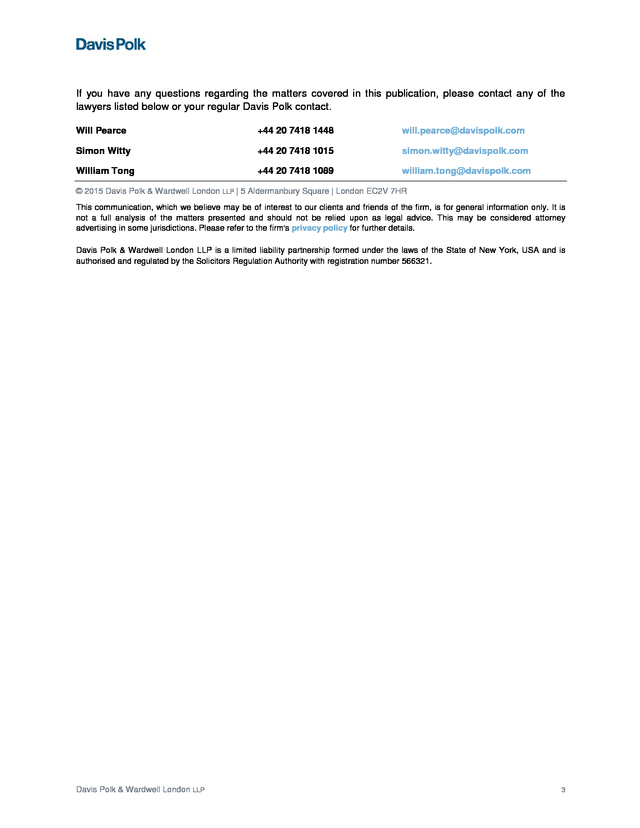UK Takeover Code – Offer-Related Arrangements and Equality of Information to Competing Offerors - October 29, 2015
Davis Polk & Wardwell
Description
CLIENT MEMORANDUM
UK Takeover Code – Offer-Related Arrangements and
Equality of Information to Competing Offerors
October 13, 2015
Introduction
The UK Takeover Panel has published two new Practice Statements on offer-related arrangements and
the equality of information to competing offerors for the purposes of obtaining regulatory consents.
On 8 October 2015, the Panel published Practice Statement No. 29 on offer-related arrangements
(Practice Statement No. 29) and Practice Statement No. 30 on information required for the purpose of
obtaining regulatory consents (Practice Statement No.
30). As Practice Statement No. 29 incorporates the contents of Practice Statement No. 23 on inducement fees and other offer-related arrangements and Practice Statement No.
27 on directors’ irrevocable commitments and letters of intent, in each case, with a number of minor amendments, Practice Statements No. 23 and No. 27 have been withdrawn. Practice Statement No.
29 – Rule 21.2 (Offer-Related Arrangements) In general, Rule 21.2 of the UK Takeover Code provides that, except with the consent of the Panel, an offeree may not enter into an offer-related arrangement with the offeror during an offer period or when an offer is in contemplation. An “offer-related arrangement” is given a broad definition under the Code: “any agreement or arrangement or commitment in connection with an offer, including any inducement fee arrangement or other arrangement having a similar or comparable financial or economic effect” but excluding certain agreements and arrangements set out in the Code. Practice Statement No. 29 provides helpful guidance on the Panel's interpretation and application of Rule 21.2 in practice.
Key points to note:  Commitments to maintain confidentiality. Whilst Rule 21.2(b)(i) permits an offeree company to enter into a non-disclosure agreement with a potential offeror company, the Panel notes that the terms of such agreement must not restrict the board of the offeree from making an announcement relating to a possible offer, or from publicly identifying the offeror.  Commitments to provide information or assistance for obtaining official authorisation or regulatory clearance. The Panel notes that Rule 21.2(b)(iii) permits an offeree to enter into a commitment with an offeror to provide information or assistance for obtaining any official authorisation or regulatory clearance.
However, this only applies to authorisations or clearances upon which the offer is conditional. In particular, Rule 21.2(b)(iii) does not permit (i) agreements to assist with other matters, for example, assistance with an offeror’s application to a tax authority to obtain a specific tax treatment, or (ii) the offeree to enter into a commitment to pay the offeror’s costs in obtaining such authorisations or clearances.  Reverse break fee. Other than in the context of a reverse takeover, Rule 21.2(b)(v) permits an offeror to pay a reverse break fee to the offeree.
This can be conditional upon the offeree company having taken or not having taken certain action, provided that there is no obligation on the offeree to take, or not to take, that action. The Panel considers that such conditions would not be permissible if they have the effect of deterring potential competing offerors from making an offer or would result in such offerors making an offer on less favourable terms. The Panel notes Davis Polk & Wardwell London LLP davispolk.com .
that it would normally be permissible for an offeror’s obligation to pay a reverse break fee to be conditional upon the offeree company’s board continuing to recommend the offeror’s offer.  Agreements relating to any existing employee incentive arrangement. The Panel notes that Rule 21.2(b)(vi) is limited to agreements relating to how existing awards under the offeree’s employee incentive arrangements would be treated in connection with an offer. In particular, an agreement that the offeree will not grant any new options to employees under its established share option schemes as well as arrangements relating to other aspects of employee remuneration or incentives are both prohibited.  Bid conduct agreements. The Panel notes that bid conduct agreements between the offeror and the offeree must not contain provisions prohibited by Rule 21.2.
The Panel states that it is not its practice to review such agreements in advance of their execution. However, if the Panel subsequently identifies any provision in such agreements which are in breach of Rule 21.2, it would initiate remedial and/or disciplinary action. As a matter of best practice, the Panel notes that bid conduct agreements should include the following clause: “The parties agree that, if the Takeover Panel determines that any provision of this agreement that requires the offeree company to take or not to take action, whether as a direct obligation or as a condition to any other person’s obligation (however expressed), is not permitted by Rule 21.2 of the Takeover Code, that provision shall have no effect and shall be disregarded.” Practice Statement No.
30 – Rule 20.2 (Information required for the purpose of obtaining Regulatory Consents) Rule 20.2 provides that any information given by an offeree company to one offeror must, on request, be given equally and promptly to a competing offeror even if the competing offeror is less welcome. Practice Statement No. 30 highlights that in certain circumstances, an offeree may wish to provide a limited amount of commercially sensitive information to certain advisers of an offeror on an “outside counsel only” basis (rather than to the offeror or a competing offeror itself), particularly in circumstances where the offeree wishes to assist the offeror in determining whether there is a need to obtain regulatory consents. The Panel notes that in such circumstances, its practice is normally to agree that Rule 20.2 will be satisfied if, upon the sensitive information being requested by a competing offeror, it is provided to the competing offeror’s advisers on the same “outside counsel only” basis.
Specifically, the Panel will not require the sensitive information to be provided directly to the competing offeror. The Panel notes that in order for it to agree to apply Rule 20.2 in this manner, it needs to be satisfied that appropriate measures have been implemented to ensure that the sensitive information will not be obtained by the first offeror or its other advisers. In addition, the Panel notes that its consent is required before any sensitive information is provided to advisers.
Practice Statement No. 30 sets out the factors the Panel will consider on receipt of a request for such consent, and the details to be provided to the Panel on making such a request. The Panel states that if any of the sensitive information is provided to an offeror in such circumstances, the Panel must be informed promptly and Rule 20.2 would then be applied to the sensitive information in the usual way. In other words, such sensitive information would need to be provided, on request, directly to a competing offeror. Davis Polk & Wardwell London LLP 2 .
If you have any questions regarding the matters covered in this publication, please contact any of the lawyers listed below or your regular Davis Polk contact. Will Pearce +44 20 7418 1448 will.pearce@davispolk.com Simon Witty +44 20 7418 1015 simon.witty@davispolk.com William Tong +44 20 7418 1089 william.tong@davispolk.com © 2015 Davis Polk & Wardwell London LLP | 5 Aldermanbury Square | London EC2V 7HR This communication, which we believe may be of interest to our clients and friends of the firm, is for general information only. It is not a full analysis of the matters presented and should not be relied upon as legal advice. This may be considered attorney advertising in some jurisdictions. Please refer to the firm's privacy policy for further details. Davis Polk & Wardwell London LLP is a limited liability partnership formed under the laws of the State of New York, USA and is authorised and regulated by the Solicitors Regulation Authority with registration number 566321. Davis Polk & Wardwell London LLP 3 .
30). As Practice Statement No. 29 incorporates the contents of Practice Statement No. 23 on inducement fees and other offer-related arrangements and Practice Statement No.
27 on directors’ irrevocable commitments and letters of intent, in each case, with a number of minor amendments, Practice Statements No. 23 and No. 27 have been withdrawn. Practice Statement No.
29 – Rule 21.2 (Offer-Related Arrangements) In general, Rule 21.2 of the UK Takeover Code provides that, except with the consent of the Panel, an offeree may not enter into an offer-related arrangement with the offeror during an offer period or when an offer is in contemplation. An “offer-related arrangement” is given a broad definition under the Code: “any agreement or arrangement or commitment in connection with an offer, including any inducement fee arrangement or other arrangement having a similar or comparable financial or economic effect” but excluding certain agreements and arrangements set out in the Code. Practice Statement No. 29 provides helpful guidance on the Panel's interpretation and application of Rule 21.2 in practice.
Key points to note:  Commitments to maintain confidentiality. Whilst Rule 21.2(b)(i) permits an offeree company to enter into a non-disclosure agreement with a potential offeror company, the Panel notes that the terms of such agreement must not restrict the board of the offeree from making an announcement relating to a possible offer, or from publicly identifying the offeror.  Commitments to provide information or assistance for obtaining official authorisation or regulatory clearance. The Panel notes that Rule 21.2(b)(iii) permits an offeree to enter into a commitment with an offeror to provide information or assistance for obtaining any official authorisation or regulatory clearance.
However, this only applies to authorisations or clearances upon which the offer is conditional. In particular, Rule 21.2(b)(iii) does not permit (i) agreements to assist with other matters, for example, assistance with an offeror’s application to a tax authority to obtain a specific tax treatment, or (ii) the offeree to enter into a commitment to pay the offeror’s costs in obtaining such authorisations or clearances.  Reverse break fee. Other than in the context of a reverse takeover, Rule 21.2(b)(v) permits an offeror to pay a reverse break fee to the offeree.
This can be conditional upon the offeree company having taken or not having taken certain action, provided that there is no obligation on the offeree to take, or not to take, that action. The Panel considers that such conditions would not be permissible if they have the effect of deterring potential competing offerors from making an offer or would result in such offerors making an offer on less favourable terms. The Panel notes Davis Polk & Wardwell London LLP davispolk.com .
that it would normally be permissible for an offeror’s obligation to pay a reverse break fee to be conditional upon the offeree company’s board continuing to recommend the offeror’s offer.  Agreements relating to any existing employee incentive arrangement. The Panel notes that Rule 21.2(b)(vi) is limited to agreements relating to how existing awards under the offeree’s employee incentive arrangements would be treated in connection with an offer. In particular, an agreement that the offeree will not grant any new options to employees under its established share option schemes as well as arrangements relating to other aspects of employee remuneration or incentives are both prohibited.  Bid conduct agreements. The Panel notes that bid conduct agreements between the offeror and the offeree must not contain provisions prohibited by Rule 21.2.
The Panel states that it is not its practice to review such agreements in advance of their execution. However, if the Panel subsequently identifies any provision in such agreements which are in breach of Rule 21.2, it would initiate remedial and/or disciplinary action. As a matter of best practice, the Panel notes that bid conduct agreements should include the following clause: “The parties agree that, if the Takeover Panel determines that any provision of this agreement that requires the offeree company to take or not to take action, whether as a direct obligation or as a condition to any other person’s obligation (however expressed), is not permitted by Rule 21.2 of the Takeover Code, that provision shall have no effect and shall be disregarded.” Practice Statement No.
30 – Rule 20.2 (Information required for the purpose of obtaining Regulatory Consents) Rule 20.2 provides that any information given by an offeree company to one offeror must, on request, be given equally and promptly to a competing offeror even if the competing offeror is less welcome. Practice Statement No. 30 highlights that in certain circumstances, an offeree may wish to provide a limited amount of commercially sensitive information to certain advisers of an offeror on an “outside counsel only” basis (rather than to the offeror or a competing offeror itself), particularly in circumstances where the offeree wishes to assist the offeror in determining whether there is a need to obtain regulatory consents. The Panel notes that in such circumstances, its practice is normally to agree that Rule 20.2 will be satisfied if, upon the sensitive information being requested by a competing offeror, it is provided to the competing offeror’s advisers on the same “outside counsel only” basis.
Specifically, the Panel will not require the sensitive information to be provided directly to the competing offeror. The Panel notes that in order for it to agree to apply Rule 20.2 in this manner, it needs to be satisfied that appropriate measures have been implemented to ensure that the sensitive information will not be obtained by the first offeror or its other advisers. In addition, the Panel notes that its consent is required before any sensitive information is provided to advisers.
Practice Statement No. 30 sets out the factors the Panel will consider on receipt of a request for such consent, and the details to be provided to the Panel on making such a request. The Panel states that if any of the sensitive information is provided to an offeror in such circumstances, the Panel must be informed promptly and Rule 20.2 would then be applied to the sensitive information in the usual way. In other words, such sensitive information would need to be provided, on request, directly to a competing offeror. Davis Polk & Wardwell London LLP 2 .
If you have any questions regarding the matters covered in this publication, please contact any of the lawyers listed below or your regular Davis Polk contact. Will Pearce +44 20 7418 1448 will.pearce@davispolk.com Simon Witty +44 20 7418 1015 simon.witty@davispolk.com William Tong +44 20 7418 1089 william.tong@davispolk.com © 2015 Davis Polk & Wardwell London LLP | 5 Aldermanbury Square | London EC2V 7HR This communication, which we believe may be of interest to our clients and friends of the firm, is for general information only. It is not a full analysis of the matters presented and should not be relied upon as legal advice. This may be considered attorney advertising in some jurisdictions. Please refer to the firm's privacy policy for further details. Davis Polk & Wardwell London LLP is a limited liability partnership formed under the laws of the State of New York, USA and is authorised and regulated by the Solicitors Regulation Authority with registration number 566321. Davis Polk & Wardwell London LLP 3 .















